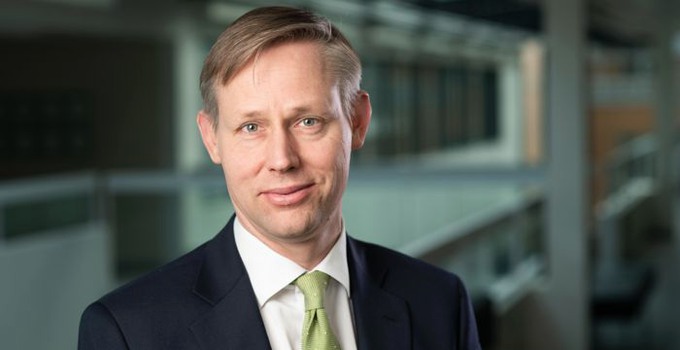
Magnus Christiansson, universitetslektor i krigsvetenskap vid Försvarshögskolan. Foto: Anders G Warne.
Research focusing on NATO
Magnus Christiansson has transitioned from being a teacher at the Karlberg Military Academy to becoming a researcher and senior lecturer at the Swedish Defence University. He frequently appears as an expert in the media, where he comments on various aspects of the Swedish NATO process.
When Magnus Christiansson began his first job as a teacher at the Karlberg Military Academy in 2000, fresh out of Lund University with a degree in political science, he found his calling immediately. His interest in security policy combined with military strategy and tactics aligned perfectly with his areas of interest, and teaching cadets alongside tacticians, strategists, technicians, and language teachers was rewarding.
"This was my dream job, and I thrived fantastically at Karlberg. I've taken a somewhat unusual path because I started with a permanent teaching position before earning my doctoral degree, but it also reflects the Swedish Defence University's development and academicization," he explains.
When the Swedish Defence University became a regular university with the Ministry of Education as its principal authority in 2008, Magnus Christianson continued his journey.
"I've been teaching cadets in some form for almost 25 years. To do it well, teaching needs to evolve in line with research, and that requires a doctoral education."
Wide research interests in war studies
He has a broad research interest in defense and security policy and has studied securitization – how an issue transforms into a security concern – to the use of violence from various perspectives. In recent years, his focus has been on security in the Nordic region and the Baltic Sea area.
"I've dipped my toes into most areas within military science, which is both an advantage and a disadvantage."
In 2020, he defended his dissertation on the transformation of the Swedish defense during the early 2000s. He specifically looks at three projects: the Nordic Battle Group, the Swedish Armed Forces' new material strategy, and the mission in Afghanistan, where he maps decision-making processes and analyzes civil-military cooperation between the government offices and the Armed Forces. One of the conclusions is that established research has an outdated view of how politics govern decision-making processes.
"It's a rough and misleading picture formed in the 1950s and 1960s, and there is a lack of insight into how things work in practice," he says.
Sweden's path to NATO
Currently, the focus is on NATO and Sweden's path into the alliance. He is working on a book on NATO's expansion together with Tuomas Forsberg. The book highlights the Nordic Baltic perspective, NATO governance, and how the alliance uses and creates military capability.
"Our ambition is for it to become something of a reference work, and the idea is for it to be published this year."
He is also working on texts for a book on Sweden in NATO, a work on geopolitics, and an anthology on small and medium-sized states. Additionally, he is involved in course development with a focus on NATO.
Spurred by media appearances
In addition to research and teaching, Magnus Christianson also spends a lot of time commenting on NATO-related issues in the media. Sometimes, perhaps too much time, he admits.
"I enjoy it, but sometimes it's too much, like during Russia's invasion of Ukraine in February 2022 when the phone rang constantly. But appearing in the media is a good way to provide perspective and give research a current hook."
In his comments, he consciously plants a thought or perspective from research, thus contributing to spreading new knowledge.
"It's an exercise in being pedagogical and explaining something complex while not looking down on viewers or listeners. It motivates me immensely."
Josefin Svensson
At a glance
At the Swedish Defence Universitys since?
"I started at Karlberg in 2000, which then became the Swedish Defence University in 2008."
When I'm free?
"I have two small children and I'm busy, but I have to take care of my family and have time to see my friends sometimes. Then I try to swim regularly, it's my way of clearing my head and keeping going."
Last book read?
"I have just finished Hans Mouritzen's and Anders Wirvel's book 'The Geopolitics of Euro-Atlantic Integration'."
Happy to discuss?
"Movies, often on a very personal level of detail with my group of friends."
More about
War StudiesPage information
- Published:
- 2024-02-19
- Last updated:
- 2024-02-23
